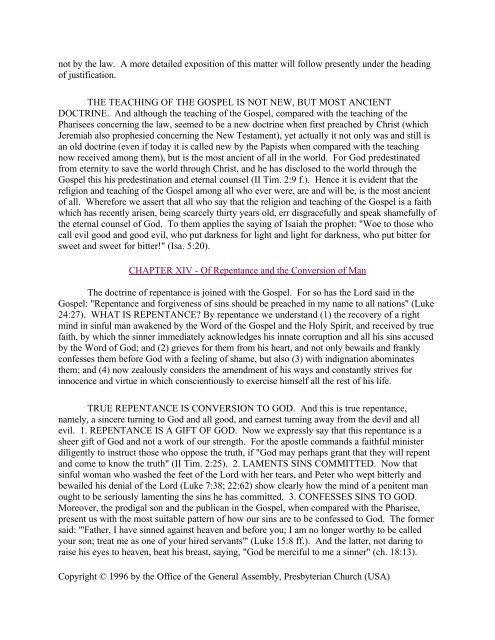The Book of Confessions - The Presbyterian Leader
The Book of Confessions - The Presbyterian Leader
The Book of Confessions - The Presbyterian Leader
You also want an ePaper? Increase the reach of your titles
YUMPU automatically turns print PDFs into web optimized ePapers that Google loves.
not by the law. A more detailed exposition <strong>of</strong> this matter will follow presently under the heading<br />
<strong>of</strong> justification.<br />
THE TEACHING OF THE GOSPEL IS NOT NEW, BUT MOST ANCIENT<br />
DOCTRINE. And although the teaching <strong>of</strong> the Gospel, compared with the teaching <strong>of</strong> the<br />
Pharisees concerning the law, seemed to be a new doctrine when first preached by Christ (which<br />
Jeremiah also prophesied concerning the New Testament), yet actually it not only was and still is<br />
an old doctrine (even if today it is called new by the Papists when compared with the teaching<br />
now received among them), but is the most ancient <strong>of</strong> all in the world. For God predestinated<br />
from eternity to save the world through Christ, and he has disclosed to the world through the<br />
Gospel this his predestination and eternal counsel (II Tim. 2:9 f.). Hence it is evident that the<br />
religion and teaching <strong>of</strong> the Gospel among all who ever were, are and will be, is the most ancient<br />
<strong>of</strong> all. Wherefore we assert that all who say that the religion and teaching <strong>of</strong> the Gospel is a faith<br />
which has recently arisen, being scarcely thirty years old, err disgracefully and speak shamefully <strong>of</strong><br />
the eternal counsel <strong>of</strong> God. To them applies the saying <strong>of</strong> Isaiah the prophet: "Woe to those who<br />
call evil good and good evil, who put darkness for light and light for darkness, who put bitter for<br />
sweet and sweet for bitter!" (Isa. 5:20).<br />
CHAPTER XIV - Of Repentance and the Conversion <strong>of</strong> Man<br />
<strong>The</strong> doctrine <strong>of</strong> repentance is joined with the Gospel. For so has the Lord said in the<br />
Gospel: "Repentance and forgiveness <strong>of</strong> sins should be preached in my name to all nations" (Luke<br />
24:27). WHAT IS REPENTANCE? By repentance we understand (1) the recovery <strong>of</strong> a right<br />
mind in sinful man awakened by the Word <strong>of</strong> the Gospel and the Holy Spirit, and received by true<br />
faith, by which the sinner immediately acknowledges his innate corruption and all his sins accused<br />
by the Word <strong>of</strong> God; and (2) grieves for them from his heart, and not only bewails and frankly<br />
confesses them before God with a feeling <strong>of</strong> shame, but also (3) with indignation abominates<br />
them; and (4) now zealously considers the amendment <strong>of</strong> his ways and constantly strives for<br />
innocence and virtue in which conscientiously to exercise himself all the rest <strong>of</strong> his life.<br />
TRUE REPENTANCE IS CONVERSION TO GOD. And this is true repentance,<br />
namely, a sincere turning to God and all good, and earnest turning away from the devil and all<br />
evil. 1. REPENTANCE IS A GIFT OF GOD. Now we expressly say that this repentance is a<br />
sheer gift <strong>of</strong> God and not a work <strong>of</strong> our strength. For the apostle commands a faithful minister<br />
diligently to instruct those who oppose the truth, if "God may perhaps grant that they will repent<br />
and come to know the truth" (II Tim. 2:25). 2. LAMENTS SINS COMMITTED. Now that<br />
sinful woman who washed the feet <strong>of</strong> the Lord with her tears, and Peter who wept bitterly and<br />
bewailed his denial <strong>of</strong> the Lord (Luke 7:38; 22:62) show clearly how the mind <strong>of</strong> a penitent man<br />
ought to be seriously lamenting the sins he has committed. 3. CONFESSES SINS TO GOD.<br />
Moreover, the prodigal son and the publican in the Gospel, when compared with the Pharisee,<br />
present us with the most suitable pattern <strong>of</strong> how our sins are to be confessed to God. <strong>The</strong> former<br />
said: "'Father, I have sinned against heaven and before you; I am no longer worthy to be called<br />
your son; treat me as one <strong>of</strong> your hired servants'" (Luke 15:8 ff.). And the latter, not daring to<br />
raise his eyes to heaven, beat his breast, saying, "God be merciful to me a sinner" (ch. 18:13).<br />
Copyright © 1996 by the Office <strong>of</strong> the General Assembly, <strong>Presbyterian</strong> Church (USA)




